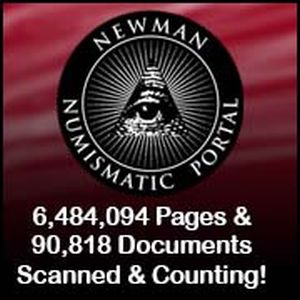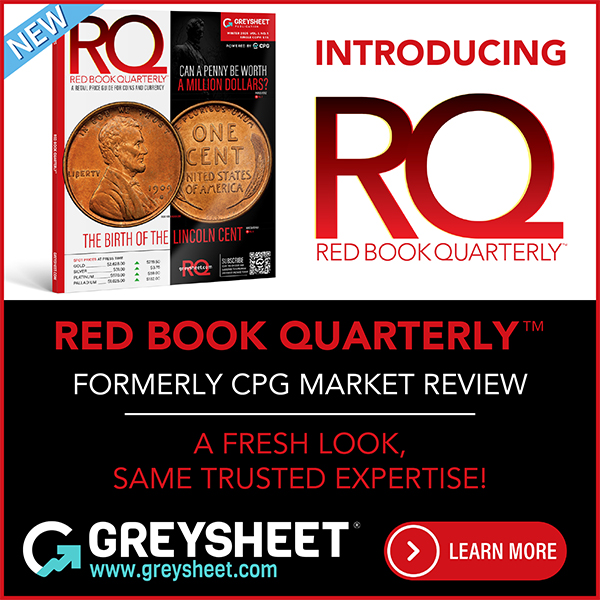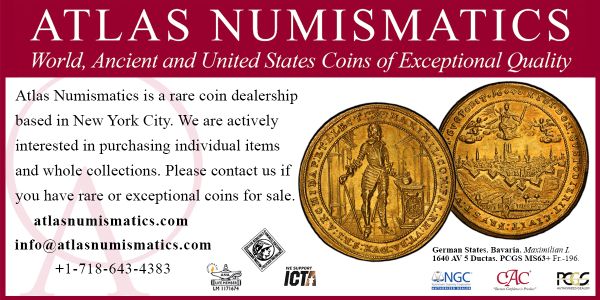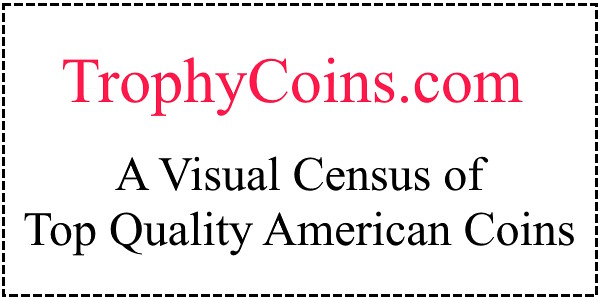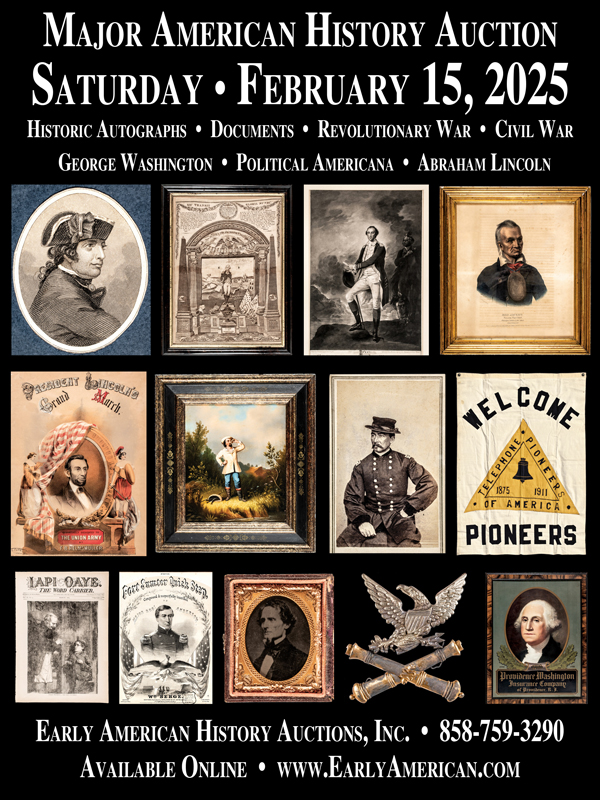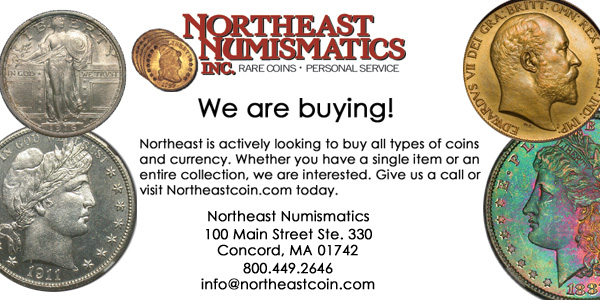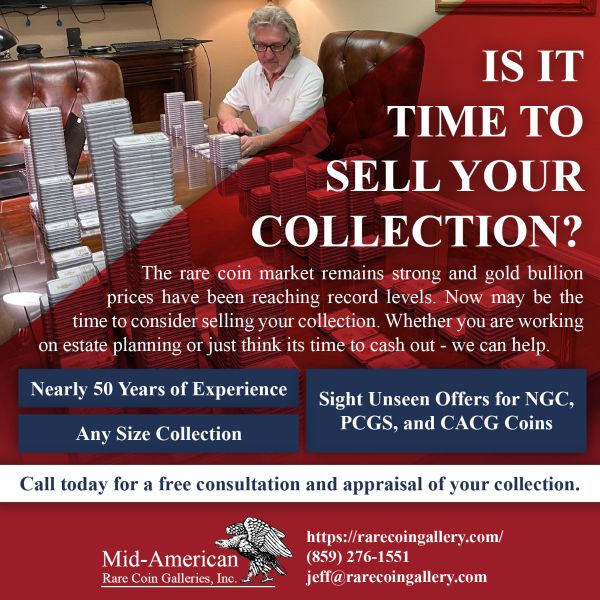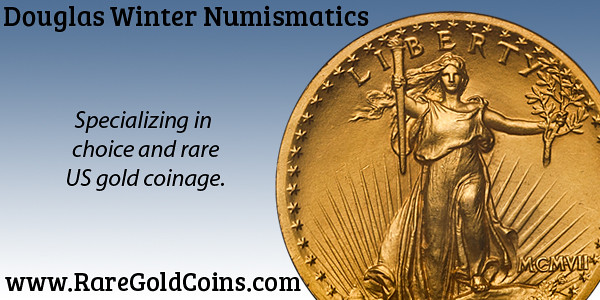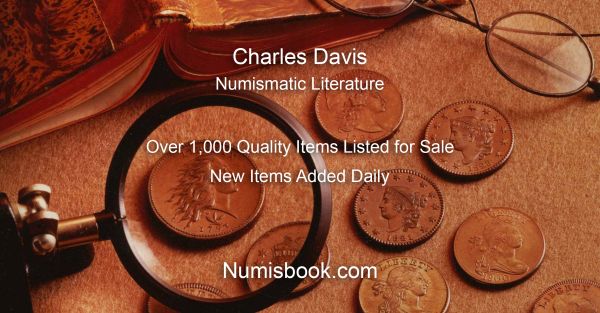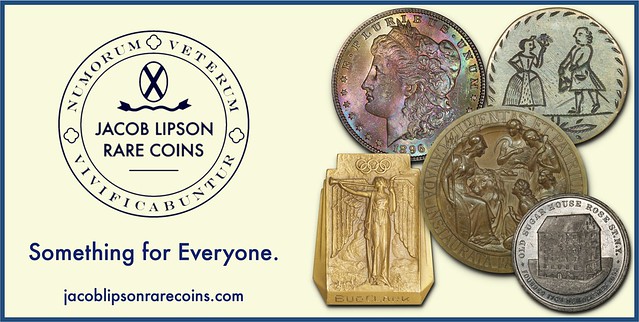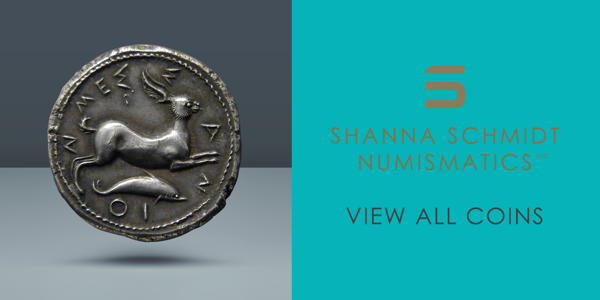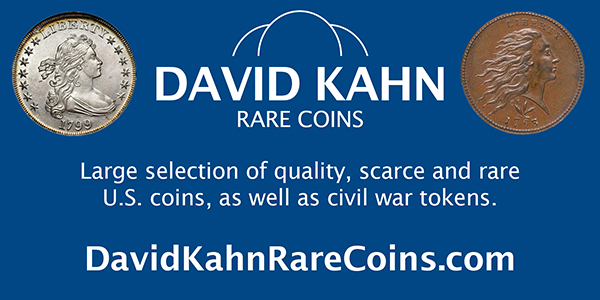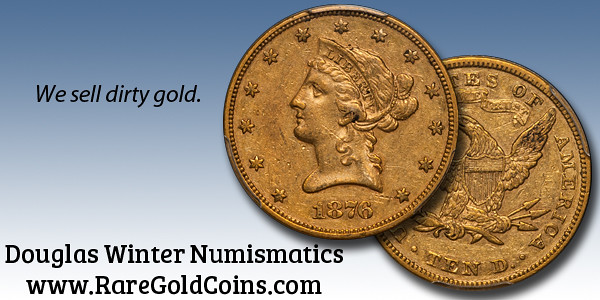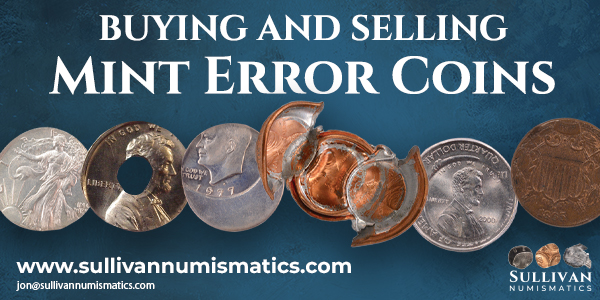
Visit our NBS Sponsors


About UsThe Numismatic Bibliomania Society is a non-profit association devoted to the study and enjoyment of numismatic literature. For more information please see our web site at coinbooks.org SubscriptionsThose wishing to become new E-Sylum subscribers (or wishing to Unsubscribe) can go to the following web page link MembershipThere is a membership application available on the web site Membership Application To join, print the application and return it with your check to the address printed on the application. Print/Digital membership is $40 to addresses in the U.S., and $60 elsewhere. A digital-only membership is available for $25. For those without web access, write to: Jeff Dickerson, Treasurer AsylumFor Asylum mailing address changes and other membership questions, contact Jeff at this email address: treasurer@coinbooks.org SubmissionsTo submit items for publication in The E-Sylum, write to the Editor at this address: whomren@gmail.com BUY THE BOOK BEFORE THE COINSale CalendarWatch here for updates! |
- WAYNE'S WORDS: THE E-SYLUM FEBRUARY 9, 2025
- NEW BOOK: CATALOGUE OF KOTALINGALA COINS
- THE E-GOBRECHT JANUARY 2025
- THE TAMS JOURNAL JAN-FEB 2025
- SUPER BOWL TOSS COINS & MEDALS
- VIDEO: COLLECTING OUTSIDE YOUR BOX
- THE PROPOSED ROYAL ACADEMY MEDAL OF 1793
- ERROR COINS THAT ‘ESCAPED THE MINT’
- NOTES FROM E-SYLUM READERS: FEBRUARY 9, 2025
- STACK’S BOWERS ACQUIRED BY A-MARK
- MORE ON A-MARK STACK’S BOWERS ACQUISITION
- SOME A-MARK COMPANY HISTORY
- STACK'S BOWERS PROFESSIONAL NUMISMATIST PROGRAM
- 2025 ANA CLUB PUBLICATIONS COMPETITION
- VOCABULARY TERM: REFLECTIVENESS
- MORE ON ALAN KESSLER
- EXHIBIT HONORS EGYPT’S PIONEER NUMISMATIST
- NUMISMAGRAM MEDAL SELECTIONS: FEBRUARY 9, 2025
- HERITAGE: ENCASED POSTAGE STAMPS
- MORE ON NUMISMATIC AUCTIONS LLC SALE 69
- HERITAGE: CONTINENTAL CURRENCY SIGNERS
- COINS OF THE FOURTH CRUSADE
- "DEVIL'S MONEY" CULT RITUALS
- COLLECTABLE COUNTERFEIT COINS, PART THREE
- COLONIAL GEORGIA COLORED SEALS, PART 1
- 1870 DOMINION OF CANADA $2 BANKNOTE
- LEGAL WIN FOR TOMMY THOMPSON
- THE 2025 CRYSTAL BALL
- LOOSE CHANGE: FEBRUARY 9, 2025
- ABOUT THIS ISSUE: FEBRUARY 9, 2025
Content presented in The E-Sylum is not necessarily researched or independently fact-checked, and views expressed do not necessarily represent those of the Numismatic Bibliomania Society.
WAYNE'S WORDS: THE E-SYLUM FEBRUARY 9, 2025
 New subscribers this week include:
Alan Harlan.
Welcome aboard! We now have 7,255 subscribers.
New subscribers this week include:
Alan Harlan.
Welcome aboard! We now have 7,255 subscribers.
Thank you for reading The E-Sylum. If you enjoy it, please send me the email addresses of friends you think may enjoy it as well and I'll send them a subscription. Contact me at whomren@gmail.com anytime regarding your subscription, or questions, comments or suggestions about our content.
This week we open with one new book, two periodical issues, updates from the Newman Numismatic Portal, error coins, notes from readers, and more.
Other topics this week include the 1793 Royal Academy medal design, a major acquisition in the numismatic world, the ANA's Club Publications competition, reflectiveness, author Alan Kessler, fixed price and auction selections, encased postage stamps, Continental Currency, Devil's Money, colonial Georgia colored seal notes, and predictions for 2025.
To learn more about the Kotalingala coins of India, "Double Dimes", Daguerreian tokens, Super Bowl Toss coins and medals, the San Francisco Mint oil pan errors, the Thursday Lunch Club, Steve Markoff and A-Mark Financial Corporation, the Kwajalein Missile Range, Dr Abdel Mohsen El-Khachab, postage stamp envelopes, and the perpetual coin show, read on. Have a great week, everyone!
Wayne Homren
Editor, The E-Sylum
NEW BOOK: CATALOGUE OF KOTALINGALA COINS
A new book has been published on the Kotalingala coins of India. -Editor
About The Book
 Kotalingala is an early historic site lying on the banks of River Godavari in the Karimnagar district of Telangana. The discovery of coins from Kotalingala in 1978 is considered as an important event in south Indian numismatics. Staggering variety of coins were found in the surface as well as in excavations conducted at this site. The coins included punch marked, uninscribed and inscribed coins. Punch marked coins belonged to Nanda and Maurya dynasties. Uninscribed coins belonged to local rulers. Inscribed coins belonged to both Pre-Satavahana local rulers namely Gobhada, Narana, Kamvayasa, Sirivayasa and Samagopa and early Satavahana kings Chimuka and Satakani etc. Chimuka was the founder of the Satavahana dynasty. There were also coins of the satraps or officials of that era. The book lists the coins found at Kotalingala and analyses their contribution to the history of Satavahana dynasty.
Kotalingala is an early historic site lying on the banks of River Godavari in the Karimnagar district of Telangana. The discovery of coins from Kotalingala in 1978 is considered as an important event in south Indian numismatics. Staggering variety of coins were found in the surface as well as in excavations conducted at this site. The coins included punch marked, uninscribed and inscribed coins. Punch marked coins belonged to Nanda and Maurya dynasties. Uninscribed coins belonged to local rulers. Inscribed coins belonged to both Pre-Satavahana local rulers namely Gobhada, Narana, Kamvayasa, Sirivayasa and Samagopa and early Satavahana kings Chimuka and Satakani etc. Chimuka was the founder of the Satavahana dynasty. There were also coins of the satraps or officials of that era. The book lists the coins found at Kotalingala and analyses their contribution to the history of Satavahana dynasty.
THE E-GOBRECHT JANUARY 2025
the January 2025 issue of the E-Gobrecht from the Liberty Seated Collectors Club has been published. -Editor
Contents
-
 President’s Message by Len Augsburger
President’s Message by Len Augsburger
- Editor’s Viewpoint: View From The Rim by Paul Kluth
- Club Announcements / Membership Application
- 2024 – COIN YEAR IN REVIEW by Rich Uhrich Jr.
- The Curious Collector: The 2025 Crystal Ball Speaks by Len Augsburger
- 2025 Precious Metals Forecast by Jeff Pritchard
- Here’s to a Big Shout Out for the LSCC by Tom Uram
- The Latest News on Liberty Seated Half Dimes by Clint Cummins and Alan Welty
- The Gerry Fortin Liberty Seated Dime Collection Sale – Thoughts as the Sale Date Approaches by Gerry Fortin
- Double Dimes – A Look Back, and a Look Forward to 2025 by John Frost
- Liberty Seated Quarter Collecting in 2024 / 2025 by Greg Johnson
-
 2024 Liberty Seated Half Dollar Year-End Report
by Bill Bugert and Dennis Fortier
2024 Liberty Seated Half Dollar Year-End Report
by Bill Bugert and Dennis Fortier
- 2024 – The Year in Review - L.S. Dollars by Dick Osburn
- Update on Reeded Edge Half Dollars by Jim Koenings
- The ANS Attends Historic Commemoration of Christian Gobrecht by Jesse Kraft
- Regional News: The Winter/Spring Regional LSCC Program Kicked Off at FUN by Ken Otto
- PRESS RELEASES - Gerry Fortin Collection & EPNNES Grant
- Club News Bulletins: New LSCC Website Goes Live & ANA Summer Seminar 2025 - New Class Offered
THE TAMS JOURNAL JAN-FEB 2025
The January-February 2025 issue of The TAMS Journal has been published. -Garrett
 The TAMS Journal
The TAMS Journal
V65, N1 January-February 2025
ARTICLES
Tin Cans and Tokens: A Numismatic History of the Oyster Industry in America
David E. Schenkman and Eric R. Schena
Selling Likeness: An Introduction to Daguerreian or Photographic Tokens (1850-1890)
Jorge L. Crespo-Armáiz, PhD
Terrace Garden, San Francisco
Michael Wehner
Maverick Transportation Tokens Identified
David E. Schenkman
SUPER BOWL TOSS COINS & MEDALS
Newman Numismatic Portal Project Coordinator Len Augsburger provided the following report on Super Bowl toss coins & medals. Thanks. -Editor
Super Bowl Toss Coins & Medals
 With the Super Bowl being the most watched event on the American sports calendar, it’s no surprise that connections to nearly all walks of life, including numismatics, come to the fore. Super Bowl medals were apparently first produced by MintAmerica in North Miami, Florida, beginning in 1973. A Coin World ad (August 22, 1973) notes "the National Football League for the first time has authorized the Official Super Bowl Medals….." These pieces were 50mm silver proofs.
With the Super Bowl being the most watched event on the American sports calendar, it’s no surprise that connections to nearly all walks of life, including numismatics, come to the fore. Super Bowl medals were apparently first produced by MintAmerica in North Miami, Florida, beginning in 1973. A Coin World ad (August 22, 1973) notes "the National Football League for the first time has authorized the Official Super Bowl Medals….." These pieces were 50mm silver proofs.
VIDEO: COLLECTING OUTSIDE YOUR BOX
The David Lisot Video Library on the Newman Numismatic Portal can be found at:
https://nnp.wustl.edu/library/multimediadetail/522852
We highlight one of his videos each week in The E-Sylum. Here's one from the 2009 ANA convention with Larry Gaye and Jerry Bobbe speaking about "Collecting Outside Your Box". -Editor
THE PROPOSED ROYAL ACADEMY MEDAL OF 1793
The Benjamin West letter last week inspired this note from Zach Filis. Thank you! -Editor
This doesn’t really answer your question about Sir Stephen Contrell, it is about medals and not coin designs.
From the British Numismatic Society, Laurence Brown’s book on British Historic Medals, Ashmolean Museum and my collection.
ERROR COINS THAT ‘ESCAPED THE MINT’
Scott Sery writes:
"A recent article in the E-Sylum involving stolen coins got me thinking again (this could be dangerous Ha !). I've always thought modern proof error coins should be considered government property which means that these were not only recently stolen, they were likely stolen from the Mint in 1972. Nothing against error coin dealers or collectors, just some thoughts of mine."
NOTES FROM E-SYLUM READERS: FEBRUARY 9, 2025
Counting on Girl Scouts Daisy Dollars
Susan Sims writes:
"I just read the E-Sylum and, as usual, found several interesting articles. The article by George Cuhaj was quite fun. I am so happy the Girl Scouts are doing this. What a fun way to learn about money and counting change. Thanks for the great issue."
Numismatics is everywhere, even in Girl Scout cookies and the Super Bowl. -Editor
To read the earlier E-Sylum article, see:
GIRL SCOUTS USA DAISY DOLLARS
(https://www.coinbooks.org/v28/esylum_v28n05a15.html)
Other topics this week include an 1879 Indian cent circulation find, Chinese "wedding coins", and the Thursday Lunch Club. -Editor
STACK’S BOWERS ACQUIRED BY A-MARK
On February 3, 2025, Stack's Bowers Galleries published an email announcement of their acquisition by A-Mark Precious Metals, Inc. -Editor
Dear Friends,
We are excited to share an important milestone in the history of Stack’s Bowers Galleries. We have entered into a definitive merger agreement to be acquired by A-Mark Precious Metals. Under this agreement, Stack’s Bowers Galleries will continue to operate as a standalone, independently operated, wholly-owned subsidiary of A-Mark, a Nasdaq-listed company. We will join A-Mark’s portfolio of industry-leading brands, including JM Bullion, Goldline, LPM Group, and Collateral Finance Corporation (CFC).
For nearly a century, Stack’s Bowers Galleries has been recognized as a leading numismatic auctioneer, entrusted with the sale of some of the most historically significant and valuable rarities and collections, as well as tens of thousands of more modestly priced numismatic collectibles. In addition to our renowned auctions, we are also a premier wholesale and retail dealership, supplying rare coins, currency, and precious metals to other retailers as well as directly to collectors. This merger with A-Mark will provide us with the resources and scale to accelerate our growth and enhance the services we offer to our valued clients.
MORE ON A-MARK STACK’S BOWERS ACQUISITION
Here's an excerpt of the A-Mark press release with more detail on the acquisition of Stack’s Bowers Galleries. -Editor
A-Mark Precious Metals, Inc., a leading fully integrated precious metals platform, has entered into a definitive agreement to acquire 100% of the stock of Spectrum Group International, Inc. (SGI), the parent of Stack’s Bowers Galleries (SBG), one of the world’s largest rare coin and currency auction houses and a leading wholesale and retail dealer specializing in numismatic and bullion products, and the majority owner of Spectrum Wine (SW), a global auctioneer, retailer and storage provider of fine and rare wine.
The transaction is intended to complement A-Mark’s core bullion business by, among other benefits, increasing its reach into strategically adjacent luxury markets that are expected to offer higher margins and expanded customer bases.
SOME A-MARK COMPANY HISTORY
Here are some bits of information on the history of A-Mark for those who may not be familiar with the firm. Many thanks to Len Augsburger of the Newman Numismatic Portal for assistance. Len notes that the earliest mention in Coin World is a July 8, 1964 want ad by what was then called the A-Mark Coin Company. -Editor
The business was founded by Steven C. Markoff. Here's an encyclopedia.com excerpt. Shown is a full-page ad in the August 23, 1967 Coin World promoting silver investments. -Editor
STACK'S BOWERS PROFESSIONAL NUMISMATIST PROGRAM
Recent years have seen more and more competition for numismatic talent, and the development of multiple internship and professional development programs for budding numismatic dealers. Excellent sign for the future of the hobby. Here's the latest - this press release describes the Stack’s Bowers Galleries 2025 Professional Numismatist Program. -Editor
 Throughout their 90+ year history in numismatics, Stack’s Bowers Galleries has had an unparalleled team
of experts at the core of their business. Their current list of professionals is world renown in all areas of numismatics and
among the best in the field. To continue this legacy, Stack’s Bowers Galleries is pleased to announce the 2025 session of their
Professional Numismatist Program scheduled from July 20-25.
Throughout their 90+ year history in numismatics, Stack’s Bowers Galleries has had an unparalleled team
of experts at the core of their business. Their current list of professionals is world renown in all areas of numismatics and
among the best in the field. To continue this legacy, Stack’s Bowers Galleries is pleased to announce the 2025 session of their
Professional Numismatist Program scheduled from July 20-25.
The program’s mission statement: To provide practical tools and build professional connections for the next generation of young adult numismatists. The lead instructor will be Devin Hipp, joined by industry leaders Greg Roberts, Jason Carter, John Kraljevich, John Pack, Kyle Ponterio, Peter Treglia, Aris Maragoudakis, and Dennis Hengeveld to name just a few. Covered topics will include advanced coin grading, wholesale trading and valuation, bullion trading, introduction to world numismatics, United States and world paper money, and an in- depth look at the entire auction process.
2025 ANA CLUB PUBLICATIONS COMPETITION
The ANA is accepting submissions for the 2025 Barbara J. Gregory Outstanding Club Publications competition. Here's the announcement. There are many great club publications being produced these days - good luck to all! -Editor
Submissions Accepted for ANA's Club Publications Competition
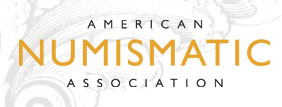 The American Numismatic Association (ANA) is currently accepting submissions for the 2023 Barbara J. Gregory Outstanding Club Publications competition. Awards will be presented in four categories: local, regional, specialty and electronic. The contest is open to member clubs that are current with their ANA dues, and do not have an elected or salaried ANA officer as editor or assistant editor. Each publication may enter in only one category. If a publication qualifies for more than one category, such as local and electronic, the submitter may choose under which category to enter.
The American Numismatic Association (ANA) is currently accepting submissions for the 2023 Barbara J. Gregory Outstanding Club Publications competition. Awards will be presented in four categories: local, regional, specialty and electronic. The contest is open to member clubs that are current with their ANA dues, and do not have an elected or salaried ANA officer as editor or assistant editor. Each publication may enter in only one category. If a publication qualifies for more than one category, such as local and electronic, the submitter may choose under which category to enter.
THE BOOK BAZARRE
VOCABULARY TERM: REFLECTIVENESS
Here's another entry from Dick Johnson's Encyclopedia of Coin and Medal Terminology. Excellent description, with a very useful list of terms. -Editor
Reflectiveness. The treated state of a metallic surface that allows light rays to be reflected from the surface in a variety of degrees from parallel rays of a mirrorlike surface to diffuse rays of a rough surface. The terms mirror, lustrous, medium, dull and dead reflectiveness express these degrees, which are created by the techniques listed on the adjacent chart.
MORE ON ALAN KESSLER
E-Sylum Feature Writer and American Numismatic Biographies author Pete Smith submitted this followup article on author Alan Kessler. Thanks! -Editor
 Two weeks ago, I knew very little about Alan Kessler. Now with contributions from Julia Casey,
Rod Widok and others, I can provide a reasonable biography.
Two weeks ago, I knew very little about Alan Kessler. Now with contributions from Julia Casey,
Rod Widok and others, I can provide a reasonable biography.
Alan Harvey Kessler was born in New York on August 12, 1938.
The 1940 Census finds him living in Manhattan with his father Samuel (1898-1977), mother Rose (1897-1969) and brothers Charles, 14 and Howard, 12. His name is indexed as Allan and the handwriting shows the name Allan with a line through the second ‘l’.
For the 1950 Census, the family is at 215 Broadway in Norwich, Connecticut. His father was the owner and manager of an IGA store.
Kessler attended Norwich Free Academy. In his freshman year, he was president of the school’s newly formed Coin Club. His 1956 senior yearbook photo mentions his other interests. He wanted to be a rocket scientist even then, a year before the 1957 launch of Sputnik I.
EXHIBIT HONORS EGYPT’S PIONEER NUMISMATIST
A new exhibit at the Egyptian Museum in Cairo honors Dr Abdel Mohsen El-Khachab, Egypt’s pioneering numismatist. -Garrett
Amid the halls of the Egyptian Museum in Cairo, where the secrets of ancient worlds whisper through gilded artefacts, a remarkable tribute has been unveiled.
A temporary exhibition shines a spotlight on the life and contributions of Dr Abdel Mohsen El-Khachab, Egypt’s pioneering numismatist, whose tireless dedication to preserving the country’s numismatic heritage continues to inspire people.
 The exhibition, which runs until mid-February, chronicles the remarkable career of Dr El-Khachab who not only laid the foundation for numismatics in Egypt but also left behind an enduring legacy that has inspired generations of archaeologists.
The exhibition, which runs until mid-February, chronicles the remarkable career of Dr El-Khachab who not only laid the foundation for numismatics in Egypt but also left behind an enduring legacy that has inspired generations of archaeologists.
"Dr El-Khachab wasn’t just Egypt’s first specialised numismatist, but he transformed how we study and protect coin collections, connecting the dots of historical narratives through them," Heba Sami, the supervisor of temporary exhibitions at the museum, told The Egyptian Gazette.
Born in Cairo in January 1906, El-Khachab had an unyielding passion for knowledge from a young age.
NUMISMAGRAM MEDAL SELECTIONS: FEBRUARY 9, 2025
Numismagram's Jeremy Bostwick sent along these four medals from his upload of new medallic art to his site. For all of the new items, please visit https://www.numismagram.com/inventory. -Editor
102934 | FRANCE. Rouen. Church of St. Ouen bronze Medal. Issued 1859. Most Remarkable Edifices of Europe series (59mm, 12h). By Jacques Wiener in Brussels and struck at the Geerts mint in Ixelles. ST OUEN À ROUEN / GRAND PORTAIL ET LES 2 FLÈCHES PAR L'ARCHIT: GREGOIRE 1847–1850, exterior view of the church from the southwest // COMMENCÉE 1318 PAR L'ABBÉ JEAN ROUSSEL / ROSES DU TRANSSEPT 1439. LA NEF ACHEVÉE 1491. GRANDE ROSE DE LA FAÇADE 1515, interior view down the nave looking eastward toward the altar/apse. Ross M223 (R1); van Hoydonck 171; Reinecke 44. PCGS SP-64. Extremely glossy and brilliant, with alluring brown surfaces that are seemingly a bit more attractive than the near gem designation would otherwise indicate. Compare to a somewhat inferior example in Stack's Coin Galleries (18 August 2009), lot 6127 (which sold for a total of $402.50) and a similarly-graded example in Stack's Bowers CCO (2 March 2023), lot 71220 (which sold for a total of $600). $545.
A former Benedictine monastic church, the current edifice was originally built as an abbey beginning in 1318, with completion coming some two centuries later due to cessations caused by the Hundred Years' War. Standing nearly 450 feet tall, its architectural style is a mix of Gothic and Flamboyant.
From what is today eastern Netherlands and western Germany, the Wieners were a Jewish family of exceptional medalists, especially known for numerous numismatic works throughout the Kingdom of Belgium. Eldest brother Jacob (Jacques), along with younger brothers Leopold and Charles, created some of the finest works of medallic art of the 19th century, and all are particularly noted for their work in the highly detailed and intricate work of architectural renderings.
To read the complete item description, see:
102934 | FRANCE. Rouen. Church of St. Ouen bronze Medal.
(https://www.numismagram.com/product-page/102934)
HERITAGE: ENCASED POSTAGE STAMPS
Heritage Auctions will be selling over 40 lots of encased postage stamps as part of their Fractional Currency and Encased Postage Showcase Auction on February 9. Select items are discussed below. -Garrett
We have over 40 lots of Encased Postage Stamps in our upcoming Fractional Currency and Encased Postage Showcase Auction that closes on February 9, 2025. Seventeen different issuers are represented amongst the 1, 3, 5, 10, and 24 Cents denominations in this auction. We also see that there are five examples of the rarer Ribbed Frame encasements. The vast majority of the pieces are from a single collection. Opening bids range from $175 to $3,500. This offering should satisfy the tastes of not only new Encased Postage collectors, but advanced collectors as well.
For the uninitiated, Encased Postage Stamps were an emergency currency at the beginning of the Civil War. The banks suspended their specie payments and the populace hoarded all the coins in circulation. This acute coin shortage forced the use of Postage Stamps as money. However, stamps became dirty and/or wet fairly quickly. Enterprising individuals came up with several solutions during this period. John Gault hit upon the idea of encasing Postage Stamps. This Yankee entrepreneur filed for a patent in the summer of 1862. Gault then had to line up customers to put their advertising on the pieces, purchase Postage Stamps, and have the Scovill Manufacturing Co. produce the Encased Postage Stamps. "Gault’s New Metallic Currency" was produced for only a short time as the United States Government’s solution to the small change shortage was Postage/Fractional Currency. Gault’s idea faded from the scene rather quickly. However, numismatists started collecting the pieces very early, thus enabling collectors to enjoy them ever since.
Our cataloging numbers come from three different sources. The HB numbers can be found in The Standard Catalogue of Encased Postage Stamps by Michael J. Hodder and Q, David Bowers. The EP numbers are the numbers used in Paper Money of the United States 23rd edition by Arthur L. and Ira S. Friedberg. The Reed numbers were conceived by Fred L. Reed III for his Civil War Encased Stamps The Issuers and Their Times. We highly recommend all three references for enjoying the collecting of Encased Postage Stamps.
MORE ON NUMISMATIC AUCTIONS LLC SALE 69
Here's some more information on the Numismatic Auctions LLC Sale 69 later this month. -Editor
Steve and Lisa Davis proudly present their upcoming Numismatic Auctions L.L.C. Auction Sale #69, closing online in a live/timed format in four sessions over four days on Monday, February 17th through Thursday, February 20th, 2025. The auction clocks in at over 1700 lots with over 1200 lots of U.S. Coins, Currency and Exonumia along with Canadian, World Gold & World Crowns and Minor Coinage and more.
The sale is highlighted by early U.S. copper coinage by type and in series with sets and singles from Colonials through Morgan & Peace Dollars featuring key dates, some in multiples, Early Type Coinage, Proof Type, Errors, Shipwreck Coinage, Proof Sets, Classic to Modern Commemorative coinage in Gold and Silver as well as Paper Money, Tokens, Medals and beyond.
HERITAGE: CONTINENTAL CURRENCY SIGNERS
Heritage Auctions will be hosting their Winter U.S. Colonial Showcase Auction on March 9, which includes uncut sheets, counterfeit detectors, contemporary counterfeits, high-grade examples, and rarities of Continental Currency. Select items are discussed below. -Garrett
Our upcoming March 9 Winter U.S. Colonial Showcase Auction features an exciting 60 lots of Continental Currency which include uncut sheets, counterfeit detectors, contemporary counterfeits, high-grade examples, and rarities. Amongst several examples of collector favorites, notable offerings include notes signed by Benjamin Levy and John Hart, two distinguished figures from Colonial America whose legacies continue to live on in both American and numismatic history.
Collectors interested in famous colonial signatures can expect to find two notes signed by Benjamin Levy, remembered to numismatists for being the only confirmed Jewish signer of Continental Currency. Looking beyond this signature, collectors might be interested to know that Levy and his family contributed importantly to early American and Jewish-American history. Benjamin’s father Moses Levy arrived in New York from England in 1695 quickly established himself as a successful trade merchant and real estate investor. Benjamin and his brother Samson both signed the Non-Importation Agreement of 1765, aimed at the repeal of the British Stamp Act implemented the same year.
COINS OF THE FOURTH CRUSADE
Mike Markowitz wrote an article in CoinWeek on the coins of the Fourth Crusade. An excerpt is found below. -Garrett
Thanks to generations of intermarriage within a relatively narrow elite, almost everyone in the Byzantine ruling class of the 12th century was related to everyone else. As a result, politics took on the character of fratricide: the war of brother against brother. This was the background against which the catastrophic events of the Fourth Crusade (1202 – 1204) unfolded. We are unusually well-informed about this crusade because written accounts survive from participants on both sides–notably the French knight Geoffroi de Villehardouin (c. 1150 – 1213)[1] and the Byzantine official and chronicler Niketas Choniates (c. 1155 – 1217)[2].
In 1198, Lotario dei Conti di Segni, from a family that produced nine cardinals and four popes, became Pope Innocent III[3]. He proclaimed a Fourth Crusade on August 15 of that year. The purpose of the Crusades was to regain the holy city of Jerusalem from the Muslims, who had captured it in 1187. Preoccupied with their own quarrels, the rulers of Europe were reluctant to campaign in the East, and it took several years to organize an army of Crusaders. It was agreed that the first target would be the powerful Muslim Ayyubid dynasty in Egypt, and the army would assemble at the great maritime city of Venice.
On September 12, 1185, the brutal and unpopular Byzantine emperor Andronikos I Komnenos was overthrown by his cousin, the rebel Isaac II Angelos, who killed an imperial officer sent to arrest him. Isaac took refuge in the great cathedral of Hagia Sophia and appealed to the population of Constantinople for support:
"DEVIL'S MONEY" CULT RITUALS
A hoard of coins from a medieval cult site has been unearthed in The Netherlands. -Garrett
Archaeologists have unearthed a hoard of gold and silver coins offered as diobolgeldæ, or "devil's money", at a medieval cult site in the Netherlands, shedding more light on the rituals of pre-Christian groups in this part of Europe.
The Netherlands, northern Germany and Britain have yielded fewer cult sites compared to the Nordic world, whose pre-Christian rituals are much better understood.
Findings from pre-Christian pagan cult sites in the Nordic region don’t always apply to the rest of the Germanic-Nordic world. But the coin hoard found in Hezingen in eastern Netherlands provides valuable insights into cult rituals in the area, researchers say.
COLLECTABLE COUNTERFEIT COINS, PART THREE
Here is the third and final part of Doug Nyholm's article "Collectable Counterfeit Coins", republished with permission from the January 2025 issue of the Utah Numismatic Society's The Mintmaster. Thank you! -Garrett
The final portion of this article is the collecting of counterfeit currency. One important note that any counterfeit modern currency that is either in circulation or your collection is illegal to possess. Therefore if for some reason you were given a fake $100 or any other denomination note you are mandated to turn it in to the Secret Service or bank and unfortunately you will not be compensated for its value.
The exceptions are Colonial Currency, Obsolete or broken bank notes, and Confederate Currency. There are quite a few examples of Colonial currency that are counterfeit and many have actually been certified. One interesting aspect of Colonial Currency is that many of the issues contain the statement "To Counterfeit is Death." Obviously this did not dissuade some counterfeiters.
COLONIAL GEORGIA COLORED SEALS, PART 1
Moving from counterfeit notes to real ones (and real interesting ones at that), here's a view into Bob Rhue's exhibit of "The Colored Seal Notes of Colonial Georgia", which won the American Numismatic Association's Howland Wood Memorial Award for Best-of-Show exhibit back in 2017. I was impressed with the exhibit at the time, and felt the exhibitor was a kindred spirit with a taste for the numismatic nuances that attract readers to The E-Sylum. I later learned, of course, that Bob is a longtime subscriber and for years now he has also been a regular sponsor.
His exhibit was photographed and memorialized on the ANA website. This series of articles dives into each of the seven exhibit cases with high-resolution images of each note. To the casual observer the notes look similar, but a closer look reveals a multitude of interesting detail. This week we start with the exbibit overview and the contents of Case 1. Shown are ANA President Jeff Garrett and Bob Rhue in 2017. -Editor
1870 DOMINION OF CANADA $2 BANKNOTE
While we don't usually discuss price or condition (preferring to stick with numismatic and historical details), Reader Kavan Ratnatunga pointed out this notable recent auction result, and Stack's Bowers published this press release as well. -Editor
In what can only be described as a monumental moment for the world of numismatics, Stack’s Bowers Galleries has announced the sale of a historic 1870 $2 Canadian banknote, payable at Victoria, for an astounding $360,000 ($518,000 CAD). The note, previously considered lost, shattered pre-sale estimates, attracting a price that reflects its rarity and significance in the world of Canadian currency. It now joins the ranks of the most expensive examples of Canadian paper money ever sold.
The 1870 $2 banknote, issued by the Dominion of Canada, represents a true numismatic treasure. Graded Choice Very Fine 35 by PMG, this is the only known example of its kind, a discovery that excited collectors and historians alike. Its historical significance stems from its designation as "Payable at Victoria," a detail that has long been absent from records, with previous catalog entries simply listing this issue as "No Known Issued Notes." Now, thanks to this remarkable find, the Charlton catalog entry for DC-3e can be updated to reflect the existence of this incredibly rare piece of Canadian history.
LEGAL WIN FOR TOMMY THOMPSON
Gerry Tebben passed along the latest update on the saga of jailed SS Central America treasure finder Tommy Thompson. Thanks. -Editor
Thomas "Tommy" Thompson, now 72, has been held in federal prison since 2015 after refusing to tell a judge — or his lawyers — where he stashed a trove of gold coins he recovered from a shipwreck.
On Friday, U.S. District Court Judge Algenon Marbley determined Thompson will continue to ignore court orders to provide the treasure's location and keeping him in prison would not change the result.
However, Thompson will remain in federal prison for another two years on a criminal contempt finding and face millions of dollars in fines when he is released. With Marbley's decision, Thompson will not be released from prison.
THE 2025 CRYSTAL BALL
With permission, we're republishing Len Augsburger's "The Curious Collector" column titled "The 2025 Crystal Ball Speaks" from the January 2025 issue of the E-Gobrecht from the Liberty Seated Collectors Club. Thanks. -Editor
Our editor, Paul Kluth, asked for a few predictions for the upcoming numismatic year. I conferred with the crystal ball, which issued its top ten predictions. I am only reporting what was conveyed to me, so I take no responsibility for the accuracy of any of this.
LOOSE CHANGE: FEBRUARY 9, 2025
Here are some additional items in the media this week that may be of interest. -Editor
Here's an excerpt of a Greysheet article by Michael Garofalo looks at the birth of the Lincoln Cent. -Editor
As the year 1909 approached, there was great pressure to honor the fallen President. But to place Lincoln’s image on a coin would be a real departure from our practice. Up until that point in time no actual historical figures, presidents or otherwise, had appeared on our coinage. The allegorical representations of Miss Liberty had dominated the obverse of our coins. Miss Liberty was our nation’s ‘role model,’ representing freedom and liberty to all of us.
But our President in 1908 was not one to let conventional wisdom make the rules. Theodore Roosevelt had complained loudly about the ‘Hideous Atrociousness’ of our bland coin designs. Roosevelt persuaded his good friend, Augustus-Saint Gaudens, to create coins that would make American coinage the envy of the world. Saint-Gaudens created two spectacular coins. He designed a $10 Gold Eagle coin with Miss Liberty wearing a Native American headdress and he also designed a $20 Gold Double Eagle which depicted Miss Liberty carrying the Torch of Freedom. Even more than 100 years later, they are regarded as some of the most beautiful coins in our history. But he was in poor health and died before he could redesign the one cent coin.
Teddy Roosevelt now had to find a great medallic sculptor to create this one cent coin, in Lincoln’s image. A Lithuanian sculptor, at age 19, came to America rather than being exiled to Siberia. Viktoras Baranauskas changed his name to Victor David Brenner.
To read the complete article, see:
The Birth of the Lincoln Cent
(https://www.greysheet.com/news/story/the-birth-of-the-lincoln-cent)
Other topics this week include the World Money Fair 2025. -Editor
ABOUT THIS ISSUE: FEBRUARY 9, 2025
It was a pretty normal week in E-Sylum Land. Throughout the week I kept up with incoming email, including new ad images from our advertisers and sponsors. Wednesday evening I picked out some articles for Garrett and sent them to him to work on. By Friday he sent me the finished products, and since he still had some time available, I gave him one more.
Regarding the new 2025 Lexington-Concord Commemorative that Northeast Numismatics is offering, Tom Caldwell shared that "They are selling like cupcakes. We once had a customer say that to us when he meant to say hot cakes.". Now I'm hungry for a cupcake.
Saturday morning I got started on the issue itself, copying and editing a template file to set up the new issue number and date, then pasting in the third and final segment of the series on collectible counterfeits. We'd formatted the entire series in advance, and this one was waiting in my hold file.
I took a break to read incoming newsletters, alerts and news in the popular press. Sometimes I find timely items to include in our issue, and this week I made note of some items in the Greysheet News. I also added and welcomed a couple new subscribers.
The next step was inserting and reviewing Garrett's articles, which gave me a welcome head start on the issue. By Saturday night I had about 19 articles done. Sunday morning I worked on something that had been in the backlog for a while - Bob Rhue's Georgia colonial currency exhibit. I created seven articles and we ran the first one tonight. The others are on hold for future issues.
Responding to a question from Ray Williams I shared how I find material for each issue - while a number of items come from readers and regular contributors, I also sign up for newsletters and notifications that come by email. Most of the bigger coin dealers and clubs have those. I don't bother going to the coin chat rooms. If anything interesting shows up there, usually someone will notify me. I go to Facebook once a day, and if I see anything of interest I'll share it to myself by email. I don't bother with most social media. I do have subscriptions to the Washington Post, New York Times and Wall Street Journal and often find something that I'll share with myself in email. On the weekend I plow thru the email to build Sunday's issue.
-Editor

